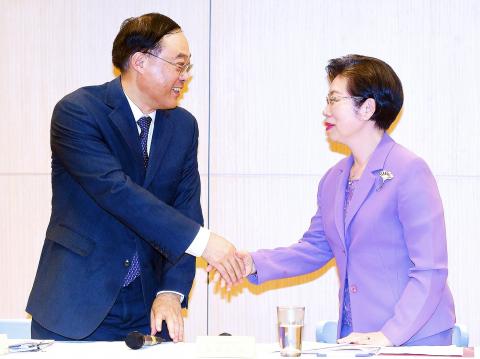The Tourism Bureau yesterday rolled out new incentives to attract tourists from nations targeted by the government’s “new southbound policy,” after the Ministry of Foreign Affairs further relaxed visa requirements for people from some Asia and Southeast Asia nations.
Bureau of Consular Affairs Director Deneral Agnes Chen (陳華玉) said that since August last year the ministry has waived visas for Thais and Bruneians.
Although the program is a trial, Chen said that it has already contributed to significant growth in visitor numbers from both countries.

Photo: Liao Chen-huei, Taipei Times
The ministry has extended the visa-waiver program for both for another year, Chen said, adding that the program is to expire on July 31 next year.
Chen said that the Philippines is to be included in the program this year, for one year.
Indian, Vietnamese, Indonesian, Burmese, Cambodian and Laotian tourists can apply for a Taiwan travel authorization certificate online, Chen said.
Such requirements are to apply to visitors from Southeast Asian countries who have been granted visas (work visa excluded) in the past 10 years and did not overstay their visas, she said.
Sri Lankans and Bhutanese can also apply for tourist visas as the ministry relaxed the screening procedures for travelers from those countries, Chen added.
Indian, Vietnamese, Indonesian, Burmese, Cambodian and Laotian business travelers can apply for electronic visas if they have recommendations from the Taiwan External Trade Development Council office in their country, she said.
The ministry said the Philippines has been included the visa-waiver program after consultation with government agencies in charge of immigration, trade, national security and others found that the number of Filipinos who have overstayed their visa are “within a controllable range.”
Tourism Bureau Director-General Chou Yung-hui (周永暉) said that the bureau considers the Philippines a strong potential tourism market.
The Philippines is geographically close and travelers can reach Taiwan within five hours, he said.
He said that the visa-waiver program would likely help increase the number of Filipino tourists by 33 percent to about 230,000 people.
The bureau also introduced the incentives to attract other international visitors, it said.
International tourists who come with tour groups could receive between NT$20,000 and NT$150,000 in subsidies if they spend three days in Taiwan and visit artistic and historic sites.
Each person could receive a subsidy of between NT$400 and NT$800 for tour groups that spend more than four days in Taiwan.
Tourists of incentive tour groups from Singapore, Malaysia, the Philippines, Thailand, Brunei, Indonesia, Vietnam, Lao, Myanmar, Cambodia, India, Bhutan, Australia and New Zealand can each receive NT$400 on the first or second day of the four-day tour in Taiwan if the group has more than 50 people, the tour said. In addition, their tour groups would receive NT$80,000 to NT$120,000 in additional subsidy if they also watch local art performances subsidized by the Ministry of Culture or historic and cultural sites recommended by the local governments, depending on the size of their tour groups.
“We estimate that the incentive will generate more than NT$800 million (US$26.18 million) in revenue,” Chou said.

Alain Robert, known as the "French Spider-Man," praised Alex Honnold as exceptionally well-prepared after the US climber completed a free solo ascent of Taipei 101 yesterday. Robert said Honnold's ascent of the 508m-tall skyscraper in just more than one-and-a-half hours without using safety ropes or equipment was a remarkable achievement. "This is my life," he said in an interview conducted in French, adding that he liked the feeling of being "on the edge of danger." The 63-year-old Frenchman climbed Taipei 101 using ropes in December 2004, taking about four hours to reach the top. On a one-to-10 scale of difficulty, Robert said Taipei 101

Nipah virus infection is to be officially listed as a category 5 notifiable infectious disease in Taiwan in March, while clinical treatment guidelines are being formulated, the Centers for Disease Control (CDC) said yesterday. With Nipah infections being reported in other countries and considering its relatively high fatality rate, the centers on Jan. 16 announced that it would be listed as a notifiable infectious disease to bolster the nation’s systematic early warning system and increase public awareness, the CDC said. Bangladesh reported four fatal cases last year in separate districts, with three linked to raw date palm sap consumption, CDC Epidemic Intelligence

Two Taiwanese prosecutors were questioned by Chinese security personnel at their hotel during a trip to China’s Henan Province this month, the Mainland Affairs Council (MAC) said yesterday. The officers had personal information on the prosecutors, including “when they were assigned to their posts, their work locations and job titles,” MAC Deputy Minister and spokesman Liang Wen-chieh (梁文傑) said. On top of asking about their agencies and positions, the officers also questioned the prosecutors about the Cross-Strait Joint Crime-Fighting and Judicial Mutual Assistance Agreement, a pact that serves as the framework for Taiwan-China cooperation on combating crime and providing judicial assistance, Liang

US climber Alex Honnold left Taiwan this morning a day after completing a free-solo ascent of Taipei 101, a feat that drew cheers from onlookers and gained widespread international attention. Honnold yesterday scaled the 101-story skyscraper without a rope or safety harness. The climb — the highest urban free-solo ascent ever attempted — took just more than 90 minutes and was streamed live on Netflix. It was covered by major international news outlets including CNN, the New York Times, the Guardian and the Wall Street Journal. As Honnold prepared to leave Taiwan today, he attracted a crowd when he and his wife, Sanni,